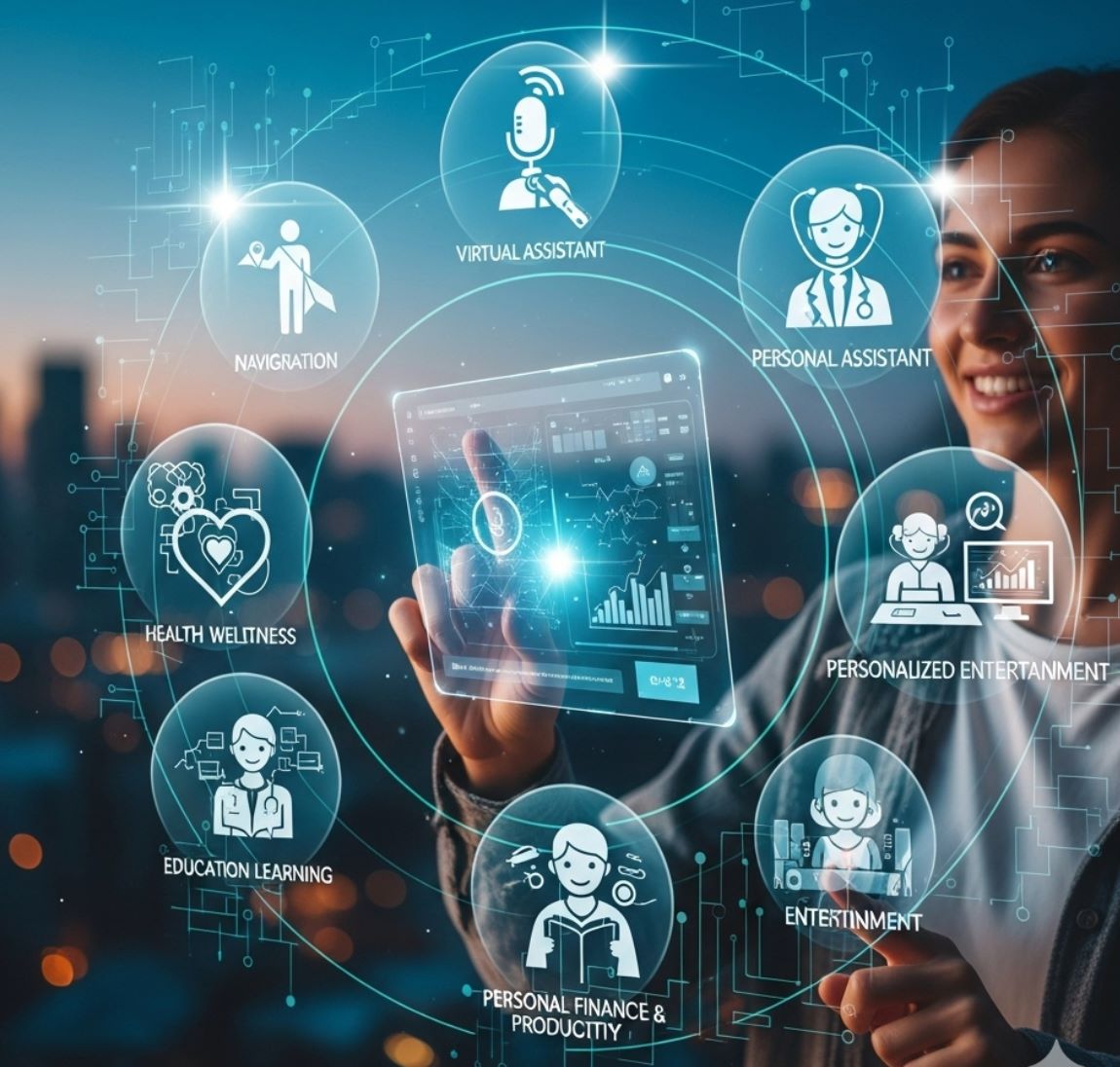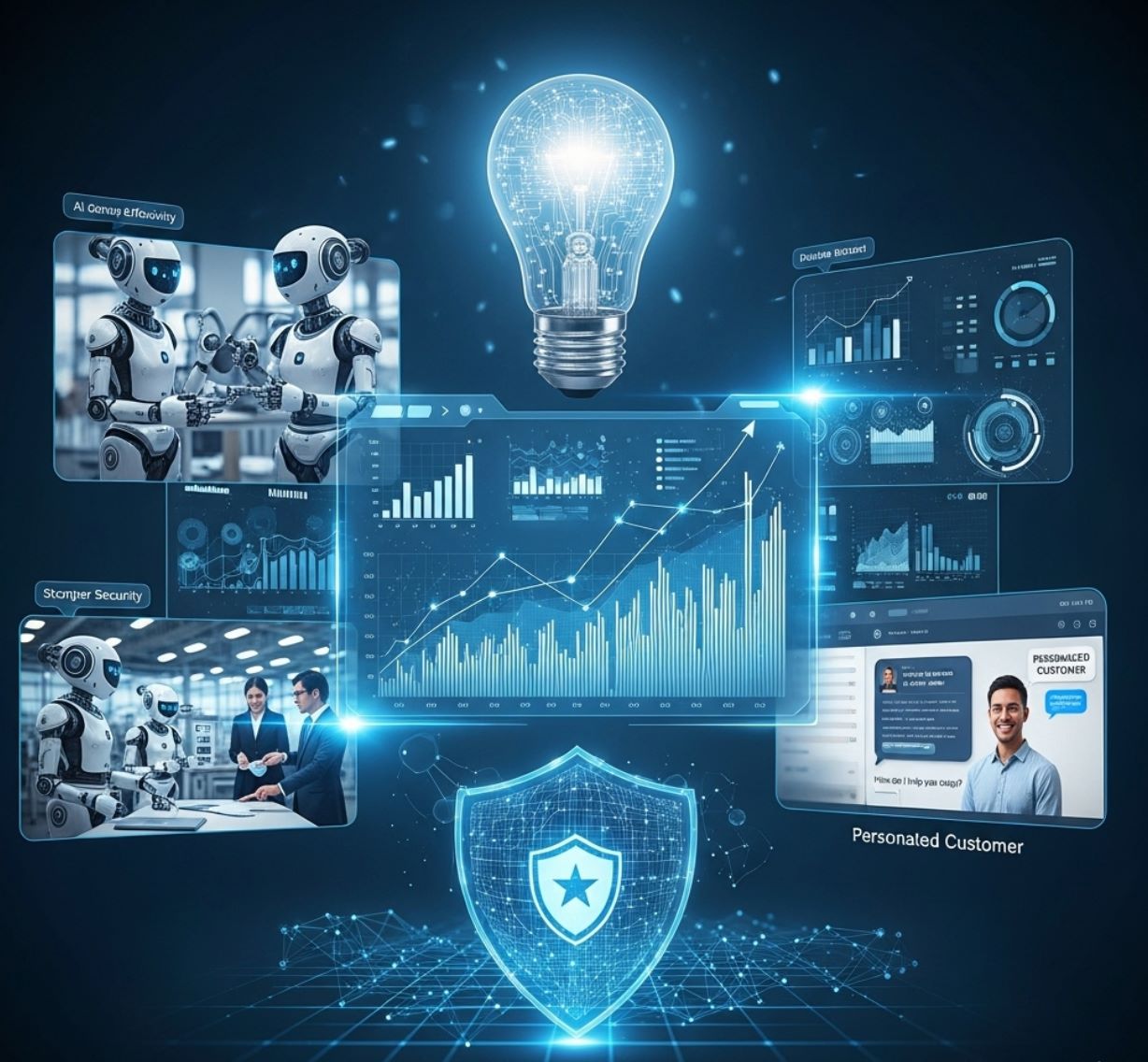Benefits of AI for Individuals and Businesses
Discover the benefits of AI for individuals and businesses: increasing productivity, optimizing costs, improving customer experience and supporting decision making.
Artificial intelligence (AI) is no longer a futuristic concept – it's an integral part of daily life and work in 2025. From smartphones to corporate boardrooms, AI-driven solutions are transforming how people live and how companies operate. We are on the brink of a technological revolution that could jumpstart productivity, boost global growth and raise incomes around the world.
In fact, experts note we're entering a transformative decade in which AI is reshaping work, life, and business, unlocking benefits in fields like healthcare, education, and even climate change solutions. This article explores the key benefits of AI for individuals in everyday life and for businesses across industries, drawing on insights from reputable sources.
Benefits of AI for Individuals
AI technologies have quickly woven into the fabric of daily life, often in ways we don't immediately notice. Whether you're using a voice assistant to set a reminder or receiving a fraud alert from your bank, AI is working in the background to make life smoother.
Everyday Convenience and Personalization
AI has become a helpful personal assistant in many homes. Smart speakers and voice assistants (like Siri, Alexa, or Google Assistant) can manage schedules, answer questions, and control smart home devices.
- Personalized music recommendations
- Tailored shopping suggestions
- Fraud detection and alerts
- AI-driven driver assistance
Better Healthcare and Wellness
AI is revolutionizing personal health by enabling faster, more accurate medical care. Machine learning algorithms can analyze medical images and identify health issues earlier and more reliably than traditional methods.
- Enhanced medical imaging analysis
- AI-powered drug development
- Precision robotic surgery
- Health monitoring wearables
Learning and Personal Development
AI is a powerful tool for education and skill development. Intelligent tutoring systems can personalize lessons to suit each learner's pace and style, whether you're picking up a new language or learning to code.
- Personalized learning experiences
- Real-time language translation
- Global knowledge accessibility
- Adaptive skill development
Accessibility and Independence
AI-powered assistive technologies are opening new possibilities for individuals with disabilities. Modern AI apps can convert speech to text, use computer vision to narrate surroundings, and integrate with prosthetics.
- Speech-to-text conversion for hearing impaired
- Computer vision for visual assistance
- AI-powered prosthetics and communication devices
- Autonomous navigation wheelchairs
- Learning disability communication aids
Generative AI and advanced robotics are being integrated into prosthetics and communication devices, giving people with disabilities greater autonomy.

Benefits of AI for Businesses
AI is an accelerator for businesses, driving efficiency and innovation across nearly every sector. Companies large and small are using AI to automate routine tasks, gain data-driven insights, and improve their products and services.
Nearly three-quarters of companies surveyed plan to adopt AI, with about 50% expecting it to lead to new job growth rather than just job cuts.
— Industry Research Survey
Increased Efficiency and Productivity
One of the most immediate benefits of AI in business is the automation of repetitive tasks, which leads to significant time and cost savings. AI can handle routine work—such as data entry, scheduling, or basic customer inquiries—much faster than humans, freeing up employees to focus on higher-value activities.
AI improves efficiency which helps business owners save time and cut costs, and even helps companies stay competitive during labor shortages by compensating for scarce skills.
— U.S. Small Business Administration
- Automated data entry and processing
- Intelligent scheduling systems
- Reduced human error rates
- Compensation for skill shortages
- Higher output with same resources
Enhanced Decision-Making with Data Insights
AI systems excel at analyzing large volumes of data to uncover patterns, trends, and insights that might be missed by humans. This capability leads to better-informed business decisions.
Real-Time Analytics
AI can crunch sales figures, customer behavior data, or market trends in seconds, providing managers with actionable insights and forecasts.
Predictive Modeling
Machine learning models can forecast future trends or customer needs, enabling proactive decision-making that keeps businesses ahead of the curve.
Improved Customer Experience and Personalization
Businesses are leveraging AI to deliver superior customer service and highly personalized marketing. AI-powered chatbots on websites and messaging apps can handle common customer questions or issues 24/7, giving instant support without needing a human agent on every query.
Traditional Support
- Days for email replies
- Limited business hours
- Generic experiences
AI-Powered Support
- Instant responses
- 24/7 availability
- Personalized experiences
AI is also used to personalize the customer experience: recommendation engines suggest products or content to users based on their browsing and purchase history, increasing engagement and sales. In fields like retail, banking, and entertainment, AI helps brands deliver the most relevant and valuable experiences to each customer.
Stronger Security and Risk Management
In an era of increasing cyber threats, AI has become indispensable for business security. AI-powered cybersecurity tools can monitor networks and systems continuously, detecting anomalies that might indicate a hacker's attack or a fraudulent transaction.
Continuous Monitoring
AI systems monitor networks and transactions 24/7, detecting suspicious patterns in real-time.
Threat Detection
Advanced algorithms identify potential fraud, money laundering attempts, and security vulnerabilities.
Instant Response
AI reacts faster than humans, often neutralizing threats and applying patches in real-time.
Innovation and Business Growth
AI isn't just about efficiency – it's a catalyst for innovation and new revenue opportunities. By handling mundane tasks, AI frees human teams to focus on creative work like product development and strategy.
- New products and services around AI capabilities (AI-driven consulting, AI-enhanced consumer gadgets)
- Fresh market opportunities and revenue streams
- Faster innovation cycles and agile business models
- Small business scaling without proportional cost increases
- Competitive differentiation through AI integration
Companies that embrace AI often find themselves at the cutting edge of their industries, able to adapt quickly to market changes and customer demands. Ultimately, AI integration can become a competitive differentiator, enabling faster innovation cycles and a more agile business model.

The Future of AI: Responsible Innovation
AI technology is evolving rapidly, and its benefits for both individuals and businesses are already evident. From making everyday life more convenient to driving massive gains in economic productivity, AI's positive impact is being felt across society.
The AI era is truly upon us, and it's up to us to harness this powerful technology for the greater good. Used wisely, AI has the potential to improve lives and drive prosperity for all.







No comments yet. Be the first to comment!